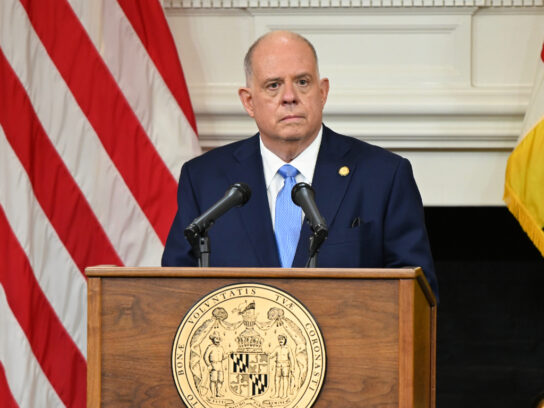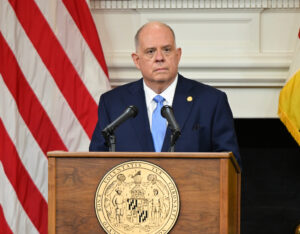
At the current pace of COVID-19 vaccine allocation, Maryland officials expect to receive 1.8 million doses from the federal government by the end of May, Gov. Larry Hogan said at a press conference Tuesday.
That’s only 30% of the state’s population, the governor said.
“So, this is going to be a long haul.” Hogan said the state expects to get about 72,000 vaccines per week from the federal government, or about 10,000 per day, until production increases.
“Now, we’re all hopeful that it will increase from there, and we all expect and hope that it will, but right now those are the real numbers that we’re counting on,” Hogan said.
He announced a new executive order requiring all providers in Maryland to report vaccination data to the state’s system, ImmuNet, within 24 hours of vaccination. He said the state will post the data for the public to see and will use it to track progress in the state. The governor announced an additional order from the health department: any facility or provider that has not used at least 75% of their vaccines may have future allocations reduced until they prove they can meet requirements. Providers with excess doses must notify their local health department so the doses can be reallocated, Hogan said. He said five counties have completed 80% or more of Phase 1A vaccinations: Montgomery, Howard, St. Mary’s, Calvert and Caroline counties.
Gov. Hogan says 5 counties have completed 80% or more of Phase 1A vaccinations: Montgomery, Howard, St. Mary's, Calvert and Caroline counties. @mymcmedia
— Maryam Shahzad (@maryam_mcm) January 5, 2021
Effective immediately, Hogan said the state is adopting a new rolling vaccine allocation model. No doses should go unused while others are in need, he said, so the state will not wait for all members of a priority group to get vaccinated before moving to the next group.
“Our message to those who are responsible for doing the vaccinations is clear: either use the doses that you have been allocated or they will be redirected to another facility or provider where they will be used immediately,” Hogan said.
Providers with excess doses must notify their local health department so they can be reallocated. @mymcmedia
— Maryam Shahzad (@maryam_mcm) January 5, 2021
He announced that the state expanded its vaccination priority phases. Phase 1A, which the state is currently in, now includes all licensed, registered and certified healthcare providers in the state. Phase 1B will now include all residents over the age of 75, teachers, childcare and education staff, special needs group homes, high risk inmates, developmentally disabled populations and continuity of government employees. Based on the current rate of vaccine allocation, Hogan said the state expects to move to Phase 1B at the end of the month.
The state also created a new Phase 1C, which includes residents ages 65-74 and employees in additional critical sectors like grocery, public transit and agricultural production. The governor expects to reach Phase 1C in March based on current rate of allocation. Under an updated Phase 2, residents ages 16-64 with increased risk due to comorbidities and essential workers in critical utilities and other sectors will be eligible for the vaccine. Under the state’s vaccine plan, the general public will become eligible in Phase 3.
Hogan said over the last three weeks, the state has distributed 270,150 vaccine doses to hospitals, nursing homes and local health departments, which is 98.7% of doses that came from the federal government. About 3,700 doses, or 1.3%, have been retained by the state for emergency backup purposes, Hogan said. On Tuesday, the state reported 11,553 new coronavirus vaccinations, which the governor said is a record. In total, he said 76,916 vaccines have been given and second doses are being administered at hospitals as of Tuesday.
Beginning Wednesday, the governor said the Maryland National Guard will dispatch support teams to help local health departments with expanding vaccination capacity. Each team will have 14 Guard members to help administer vaccines and offer logistical support.
Beginning tomorrow, the MD National Guard will dispatch vaccination support teams to help local health depts with expanding vaccination capacity. Each team will have 14 guard members to help give vaccines + logistical support. @mymcmedia
— Maryam Shahzad (@maryam_mcm) January 5, 2021



Comments are closed.